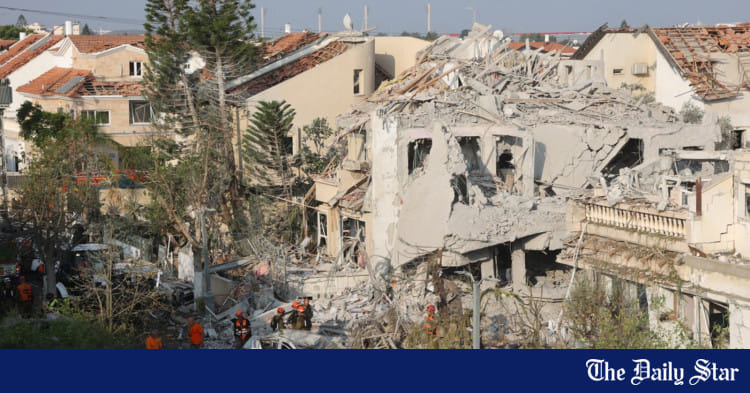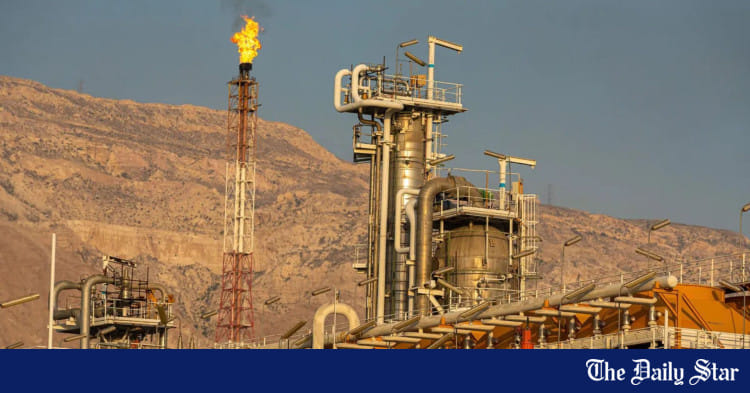- Copy to clipboard
- Thread starter
- #586
Saif
Senior Member
- Messages
- 14,479
- Reaction score
- 7,589
- Origin

- Residence

- Axis Group


Israel says attacks on Iran are 'nothing' compared with what is coming
Iran and Israel traded missiles and airstrikes on Saturday, the day after Israel launched a sweeping air offensive against its old enemy, killing commanders and scientists and bombing nuclear sites in a stated bid to stop it building an atomic weapon. Israeli Prime Minister Benja
Israel says attacks on Iran are 'nothing' compared with what is coming
REUTERS
Published :
Jun 14, 2025 22:23
Updated :
Jun 14, 2025 22:24

Iran and Israel traded missiles and airstrikes on Saturday, the day after Israel launched a sweeping air offensive against its old enemy, killing commanders and scientists and bombing nuclear sites in a stated bid to stop it building an atomic weapon.
Israeli Prime Minister Benjamin Netanyahu said Israel's strikes had set back Iran's nuclear programme possibly by years but rejected international calls for restraint, saying the attack would be intensified.
"We will hit every site and every target of the Ayatollahs' regime, and what they have felt so far is nothing compared with what they will be handed in the coming days," he said in a video message.
In Tehran, Iranian state TV reported that around 60 people, including 20 children, had been killed in an attack on a housing complex, with more strikes reported across the country. Israel said it had attacked more than 150 targets.
In Israel, air raid sirens sent residents into shelters as waves of missiles streaked across the sky and interceptors rose to meet them. At least three people were killed overnight. An Israeli official said Iran had fired around 200 ballistic missiles in four waves.
U.S. President Donald Trump has lauded Israel's strikes and warned of much worse to come unless Iran quickly accepts the sharp downgrading of its nuclear programme that the U.S. has demanded in talks that had been due to resume on Sunday.
But with Israel saying its operation could last weeks, and urging Iran's people to rise up against their Islamic clerical rulers, fears have grown of a regional conflagration dragging in outside powers.
The United States, Israel's main ally, helped shoot down Iranian missiles, two U.S. officials said.
"If (Supreme Leader Ayatollah Ali) Khamenei continues to fire missiles at the Israeli home front, Tehran will burn," Israeli Defence Minister Israel Katz said.
Iran had vowed to avenge Friday's Israeli onslaught, which gutted Iran's nuclear and military leadership and damaged atomic plants and military bases.
REUTERS
Published :
Jun 14, 2025 22:23
Updated :
Jun 14, 2025 22:24
Iran and Israel traded missiles and airstrikes on Saturday, the day after Israel launched a sweeping air offensive against its old enemy, killing commanders and scientists and bombing nuclear sites in a stated bid to stop it building an atomic weapon.
Israeli Prime Minister Benjamin Netanyahu said Israel's strikes had set back Iran's nuclear programme possibly by years but rejected international calls for restraint, saying the attack would be intensified.
"We will hit every site and every target of the Ayatollahs' regime, and what they have felt so far is nothing compared with what they will be handed in the coming days," he said in a video message.
In Tehran, Iranian state TV reported that around 60 people, including 20 children, had been killed in an attack on a housing complex, with more strikes reported across the country. Israel said it had attacked more than 150 targets.
In Israel, air raid sirens sent residents into shelters as waves of missiles streaked across the sky and interceptors rose to meet them. At least three people were killed overnight. An Israeli official said Iran had fired around 200 ballistic missiles in four waves.
U.S. President Donald Trump has lauded Israel's strikes and warned of much worse to come unless Iran quickly accepts the sharp downgrading of its nuclear programme that the U.S. has demanded in talks that had been due to resume on Sunday.
But with Israel saying its operation could last weeks, and urging Iran's people to rise up against their Islamic clerical rulers, fears have grown of a regional conflagration dragging in outside powers.
The United States, Israel's main ally, helped shoot down Iranian missiles, two U.S. officials said.
"If (Supreme Leader Ayatollah Ali) Khamenei continues to fire missiles at the Israeli home front, Tehran will burn," Israeli Defence Minister Israel Katz said.
Iran had vowed to avenge Friday's Israeli onslaught, which gutted Iran's nuclear and military leadership and damaged atomic plants and military bases.













